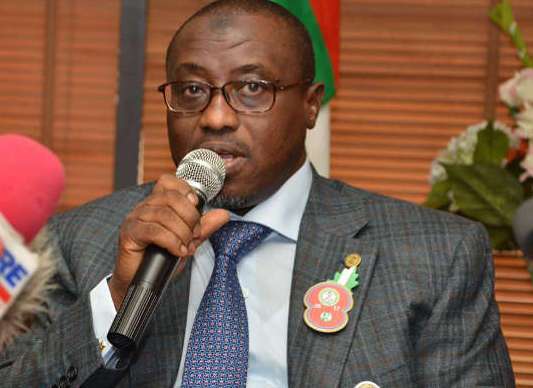The group managing director, Nigerian National Petroleum Corporation (NNPC), Dr Maikanti Baru, said the corporation had signed over $3billion oil and gas development deal to ensure development in the sector.
Baru disclosed this while speaking on investment in the Oil and Gas Industry at the ongoing 7th OPEC International Seminar on Thursday in Vienna, Austria.
He said that the deal was a third party financing deals with international banks adding that oil revenue remained vital for building the nation’s economy.
He said the NNPC recognised the challenge as well as the opportunity oil demand growth presented for the country.
“The balance of objectives requires that we undertake a paradigm shift in our business model to ensure that we attract capital and sustain flow of investment.
“Much more, the recent fiscal challenge experienced by the nation places a burden for change; hence we have undertaken to broaden the base of investment sources outside traditional government funding.
“To encourage the existing players in the industry, particularly the traditional JV partners, we undertook to settle all outstanding cash call arrears amounting to 5 billion dollars.
“This has restored confidence in the Nigerian oil and gas industry. “We have also signed third party financing deals with international banks on new oil and gas development worth over 3 billion dollars,” he said.
Baru said the NNPC had also executed a contractor financing deal of about 1 billion dollars with Schlumberger for the development of 250 Million Barrels of Oil Equivalent fields in the Niger Delta.
He also spoke about gas supply to the domestic market which he said had tripled from 500mmscf/d in 2010 to about 1500mmscf/d currently.
“We have completed and commissioned almost 600km of new gas pipelines thereby connecting all existing power plants to permanent gas supply pipeline.
“The recently sanctioned $2.8 billion, 614 Km Ajaokuta-Abuja-Kaduna-Kano pipeline projects is a demonstration of commitment to investing in local gas development,” he said.
Also, the Chairman of the Board of Directors, National Oil Corporation, Libya, Mr Mustafa Sanalla, said the 2011 uprising in the country saw production fall by about 450,000 barrels per day.
He said between 2012 and 2017, the country had lost an equivalent of 107 billion dollars in oil production.
Meanwhile, the Minister of Energy, Industry and Mineral Resources, Saudi Arabia, Mr Khalid Al-Falih, said the country would not allow a glut to materialise again in the market.
He also said he was confident that on Saturday, when OPEC and non-OPEC members meet to decide whether or not to lift the oil production cut, they would reach a consensus.
Al-Falih was hopeful of an agreement to boost oil production and that the bone of contention would be the distribution of the increase among participating countries.
Meanwhile, Iran’s decision to support a small rise in planned crude oil output by the Organization of Petroleum Exporting Countries (OPEC) , marginally affected oil prices which fell yesterday.
The support has potentially paved the way for the producer cartel to agree a supply increase during a meeting on Friday. However, prices were prevented from dropping further by record refinery runs in the United States and a large decline in crude inventories, a sign of strong fuel demand in the world’s biggest economy.
Brent crude futures were at $74.51 per barrel down 23 cents, or 0.3 percent, from their last close, while the U.S. West Texas Intermediate (WTI) crude futures were at $65.64 a barrel, down 7 cents, or 0.1 percent.
Iran, a major supplier within the producer cartel of the Organization of the Petroleum Exporting Countries (OPEC), signalled on Wednesday it could agree on a small increase in the group’s output during a meeting to be held at OPEC’s headquarters in Vienna on June 22 together with non-OPEC member but top producer Russia.
“There appears to be an air of confidence that this deal will move through,” said Stephen Innes, head of trading for Asia-Pacific at futures brokerage OANDA in Singapore.
We expect OPEC and Russia to gradually add supplies back to the market by next year, mostly offsetting the almost 1 million barrels per day (bpd) supply disruption in Venezuela,” Barclays bank said.
Iran had previously resisted pressure by OPEC’s de-facto leader Saudi Arabia to raise output. Even with Iran appearing to fall in line, analysts do not expect a harmonious OPEC meeting.
“Our expectations are for a tense, discordant and highly geopolitical OPEC+ meeting,” said Japan’s Mitsubishi UFJ Financial Group in a note to clients. OPEC, together with other key producers including Russia, started withholding output in 2017 to prop up prices, but a tightening market in 2018 led to calls by major consumers for more supplies. In a sign of robust demand, U.S. refineries processed a seasonal record of 17.7 million bpd of crude oil last week, according to data from the Energy Information Administration (EIA) said on Wednesday.
Amid strong consumption, commercial U.S. crude inventories dropped by 5.9 million barrels in the week to June 15, to 426.53 million barrels, the EIA said. U.S. crude oil production was flat week-on-week, remaining at a record 10.9 million bpd. Beyond the short-term, Barclays said there were headwinds for oil prices.
“Deleveraging in China and a weakening in the narrative around synchronous global economic growth are likely to add headwinds for all commodities,” it said




